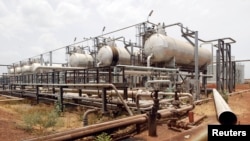AWEIL, SOUTH SUDAN —
Five South Sudanese women, including a widow with small children, were jailed this week in Aweil East after they failed to pay a state household tax of 30 South Sudanese pounds (7 U.S. dollars), and two local chiefs have been relieved of their duties after refusing to collect the tax.
One of the women, Nyirou Mou, 30, has been in jail since Tuesday and says she doesn't have enough money to pay the annual tax that the state assembly in Northern Bahr el Ghazal introduced in January. Residents were given until this month to pay the tax.
“I don’t have anywhere where I can get the money for taxes. My children are small. They can’t do any work, such as cultivating gardens. My husband died and there is no one taking care of my kids except me. Where can I get the money from?” she asked.
The average annual income among South Sudanese is around $3.50 US a day.
Mou said she has been told she will only be released when someone brings the money she owes to the police station.
Aweil East Commissioner Awet Kiir Awet said two chiefs were suspended for refusing to collect the tax in areas they are responsible for.
Northern Bahr el Gazal’s Finance Minister Madut Santino Deng said the tax was imposed to fill a revenue gap after the South Sudanese government cut off oil production last year, amid a dispute with Khartoum over fees to carry crude from oil-rich South Sudan through pipelines in Sudan.
According to the World Bank, South Sudan is the most oil-dependent nation in the world, with crude accounting for nearly all of the country's exports and 80 percent of gross domestic product.
Although oil production has restarted, Deng said state governments are not expecting to see revenues from the key resource for several months.
“We have to implement this household tax to back-up our budget," Deng said.
"The household tax is benefiting the counties, because counties will take 60 percent from that tax," he said, adding that counties can choose how to allocate the household tax revenues.
Residents have complained that they have not seen improvements to services since they started paying the new tax, but Awet said the revenues will not be disbursed to counties until all of the money has been collected.
He also warned that police officers will continue to arrest residents who refuse to pay the tax.
One of the women, Nyirou Mou, 30, has been in jail since Tuesday and says she doesn't have enough money to pay the annual tax that the state assembly in Northern Bahr el Ghazal introduced in January. Residents were given until this month to pay the tax.
“I don’t have anywhere where I can get the money for taxes. My children are small. They can’t do any work, such as cultivating gardens. My husband died and there is no one taking care of my kids except me. Where can I get the money from?” she asked.
The average annual income among South Sudanese is around $3.50 US a day.
Mou said she has been told she will only be released when someone brings the money she owes to the police station.
Aweil East Commissioner Awet Kiir Awet said two chiefs were suspended for refusing to collect the tax in areas they are responsible for.
Northern Bahr el Gazal’s Finance Minister Madut Santino Deng said the tax was imposed to fill a revenue gap after the South Sudanese government cut off oil production last year, amid a dispute with Khartoum over fees to carry crude from oil-rich South Sudan through pipelines in Sudan.
According to the World Bank, South Sudan is the most oil-dependent nation in the world, with crude accounting for nearly all of the country's exports and 80 percent of gross domestic product.
Although oil production has restarted, Deng said state governments are not expecting to see revenues from the key resource for several months.
“We have to implement this household tax to back-up our budget," Deng said.
"The household tax is benefiting the counties, because counties will take 60 percent from that tax," he said, adding that counties can choose how to allocate the household tax revenues.
Residents have complained that they have not seen improvements to services since they started paying the new tax, but Awet said the revenues will not be disbursed to counties until all of the money has been collected.
He also warned that police officers will continue to arrest residents who refuse to pay the tax.
